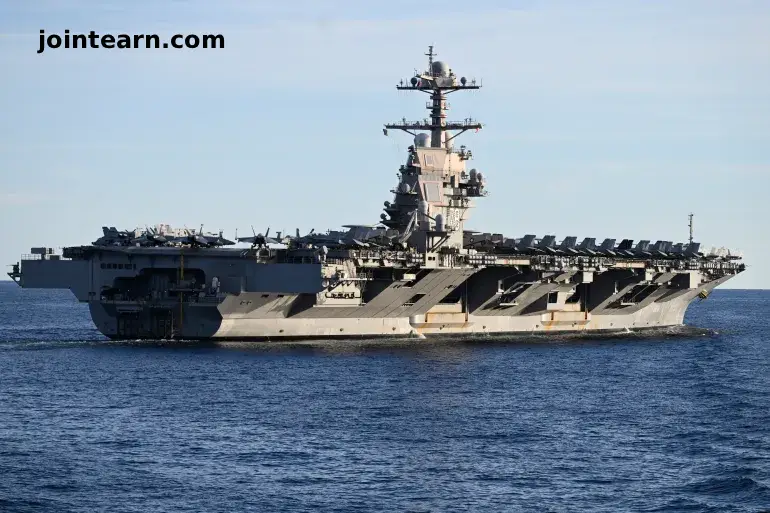
Washington, D.C. / Caracas — The United States has announced the deployment of an aircraft carrier strike group to Latin America, a move widely interpreted as a dramatic escalation of its military posture toward Venezuela.
The USS Gerald R. Ford, the world’s largest aircraft carrier, will lead a fleet of five guided-missile destroyers in a show of force that underscores the Trump administration’s increasingly confrontational approach to the Venezuelan government of President Nicolás Maduro.
Pentagon spokesperson Sean Parnell confirmed on Friday that Secretary of Defense Pete Hegseth had ordered the deployment, describing it as a mission to enhance U.S. capabilities in detecting and disrupting “illicit activities that threaten the safety and prosperity of the United States homeland and our partners in the Western Hemisphere.”
A Show of Force Beyond Counter-Narcotics
While the Pentagon framed the move as part of anti-drug operations under U.S. Southern Command (USSOUTHCOM), analysts and officials in the region have warned that the deployment suggests intentions far beyond routine interdiction missions.
The U.S. currently maintains about 6,000 sailors and Marines aboard eight warships stationed across the Caribbean and Latin American waters. The addition of the USS Gerald R. Ford strike group—including 4,500 personnel—marks the most significant American military buildup in the region in decades.
The carrier is currently operating in the Mediterranean Sea, but Pentagon officials did not specify when it would arrive in Latin American waters.
Trump Administration’s Escalating Confrontation with Caracas
The deployment follows a series of provocative actions by the Trump administration, which in recent weeks has authorized new CIA operations in Venezuela and expanded naval patrols in the Caribbean under the pretext of combating drug trafficking.
President Donald Trump last week stated that he had given the Central Intelligence Agency authority to conduct covert operations targeting the Maduro government. Reports from U.S. intelligence agencies, however, have consistently found little evidence to support claims that Venezuela is a central player in the global drug trade or that its government controls trafficking networks.
Critics have accused Washington of manufacturing a narrative to justify military aggression. The United Nations and several international law experts have denounced recent U.S. strikes on alleged “drug vessels” as violations of international law and acts of extrajudicial execution.
Venezuela Vows to Defend Its Sovereignty
The Maduro administration has condemned the U.S. deployment as an act of intimidation and warned that any attempt to overthrow the government would be met with “a forceful response.”
“Interpret it however you want: the Armed Forces will not allow a government here that is subservient to the interests of the United States,” said Foreign Minister Vladimir Padrino in a televised address.
Calling the situation “the most significant military threat in the last 100 years,” Padrino emphasized that Venezuela “does not want war” but will defend its sovereignty and territorial integrity “by all necessary means.”
Regional and Global Implications
The U.S. deployment is expected to further heighten tensions across Latin America, particularly among left-leaning governments aligned with Venezuela, such as Cuba and Nicaragua.
Analysts warn that the move could provoke a proxy standoff between Washington and Moscow, given Russia’s continued support for the Maduro government through arms sales and energy cooperation.
As of Friday, the U.S. State Department has declined to comment on whether diplomatic backchannels remain open with Caracas. Trump, when asked about reports that Maduro had offered concessions to ease tensions, appeared dismissive, saying only that “the time for talking may be over.”
Background: Longstanding U.S.-Venezuela Hostilities
Relations between the United States and Venezuela have been strained for over two decades, dating back to the presidency of Hugo Chávez. Washington has imposed layers of economic sanctions on Caracas, citing corruption, drug trafficking, and human rights violations.
Under Trump, those measures have intensified, including efforts to block Venezuelan oil exports, freeze government assets, and support opposition leader Juan Guaidó.
The new military escalation signals that the administration may be preparing for direct intervention—or at least testing the limits of Venezuelan military readiness.
Conclusion
The deployment of the USS Gerald R. Ford strike group marks a decisive moment in U.S. foreign policy toward Latin America. While the Pentagon insists the move is defensive and focused on counter-narcotics operations, the scale of the mobilization suggests a broader agenda aimed at pressuring or potentially destabilizing the Maduro government.
As regional tensions mount, international observers warn that a miscalculation on either side could ignite a conflict with far-reaching consequences for hemispheric stability.


Leave a Reply